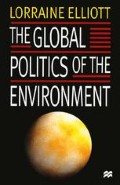Abstract
The phrase ‘environmental security’ is a relatively new one in the lexicon of global environmental politics. Perhaps because of this, the meaning of the term, the processes it describes and the policy prescriptions it engenders are contested. Brock argues that the idea of environmental security might lead to either a militarisation of environmental politics or a demilitarisation of security thinking (1991, p. 407) and the literature and policy debates tend generally to follow one of these two paths. The first might be characterised as the ‘environment-and-security’ approach in which, as Finger notes, ‘the ecological crisis now confronting us [is] increasingly … defined as a threat to national security’ (1991b, p. 220). The primary referent for security is the state and the primary security concern is the potential for violence, conflict or military action as a result of and in response to environmental degradation. Thus environmental threats are added on to a traditional, geopolitical national security agenda. The second approach emphasises ‘securing the environment’, by which the integrity of the environment is both security referent and security goal and in which environmental degradation is to be taken at least as seriously as traditional military threats.
Preview
Unable to display preview. Download preview PDF.
Copyright information
© 1998 Lorraine Elliott
About this chapter
Cite this chapter
Elliott, L. (1998). Environmental Security. In: The Global Politics of the Environment. Palgrave, London. https://doi.org/10.1007/978-1-349-26033-1_10
Download citation
DOI: https://doi.org/10.1007/978-1-349-26033-1_10
Publisher Name: Palgrave, London
Print ISBN: 978-0-333-63367-0
Online ISBN: 978-1-349-26033-1
eBook Packages: Palgrave Political & Intern. Studies CollectionPolitical Science and International Studies (R0)

